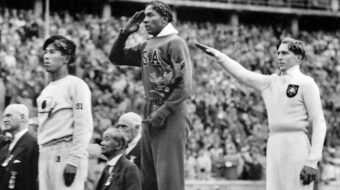
Ron DeSantis, Florida’s MAGA Republican governor, is reprising “the biggest historical fiction ever,” according to Murray, Ky., State University historian Brian Clardy.
Clardy said the original fraudsters were Confederate apologists. A century ago, they started a campaign to distort Civil War history, thus creating a “Lost Cause” myth that permeated textbooks and popular culture and largely went unchallenged for decades.
Marginalizing Black Americans and other people of color in history books and school curricula is the latest front in the nearly all-white hard-right’s culture war against minorities, Clardy said. Their targets also include LGBTQ Americans.
DeSantis, once among the most feckless of Trump sycophants, evidently aims to take on The Donald for the GOP presidential nod next year. “He’s trying to turn Trump’s flank,” Clardy said.
DeSantis championed and signed a law passed by the Sunshine State’s Republican-majority legislature that says school books “‘must be selected by a school district employee who holds a valid educational media specialist certificate,’—in most cases, the school librarian,” wrote Amanda Marcotte in Salon last month.
“DeSantis has made it quite clear what kinds of ideas he believes should be banned in the state of Florida. He doesn’t want schools to acknowledge that LGBTQ people exist. He’s banned the teaching of Black history classes on the grounds that lessons on people like Frederick Douglass or Rosa Parks, for instance, ‘have no educational value.’ He has been forcing schools to teach a lie, that racism is not the cause of racial inequality.
“With that level of pressure, it is no surprise that schools would simply err on the side of having few if any, books available. If books return to the shelves, they may likely be heavily limited to those that portray the world like it’s a 1950s sitcom, which pretty much guarantees they’ll go unread, as such themes hold little interest to kids in 21st-century America.”
In early 20th-century America, the United Confederate Veterans, the United Daughters of the Confederacy, and the Sons of Confederate Veterans organized a committee to get the Lost Cause myth into textbooks. The panel was dubbed the Rutherford Committee for its chair, the UDC’s Mildred Lewis Rutherford—the Ron DeSantis of her day.
Clardy said the UDC, egged on by the UCV and SCV, took the lead in “recasting the Civil War, not as a war against slavery, which it was, but as a war for so-called ‘states’ rights,’ and recasting the Confederacy in romantic terms. They said that slavery really wasn’t as horrific as its detractors said it was, and that slave and slave owner lived as family.”
The Lost Cause line featured the canard that slaves were universally happy in bondage and that severe punishment, including whipping, was rare. In other words, enslavers and enslaved supposedly “lived in harmony,” Clardy said.
The falsehood grew in the postwar Reconstruction period. Southern white supremacists deliberately ignored historical evidence and depicted the defeated Confederates as helpless victims of vengeful, victorious Yankees. The ex-Confederates got off astonishingly easy compared to losers in other armed rebellions in other countries.
There were no mass executions, no mass imprisonments, and no mass confiscation of land and property. Most former rebels ultimately got their citizenship back; after Reconstruction, the pre-war planter aristocracy—including many who had been leaders in the Confederate military and government—returned to dominance in Southern politics and society.
The Ku Klux Klan had worked hand-in-glove with these so-called “Redeemers” to subvert the bi-racial Reconstruction governments, terrorize the newly-freed slaves, and reinstate white supremacy and oppression of Black Americans as close to slavery as possible under the 13th Amendment.
Armed, hooded, and robed Klan groups lynched, tortured, and burned out Black people while law officers looked the other way. More than a few lawmen themselves were Klansmen.
Nonetheless, the UDC pushed the Lost Cause lie, insisting that Klansmen were heroes and gallant defenders of white Southern homes and hearths—and especially white Southern womanhood.
In a Facing South article, Greg Huffman wrote that in 1926, the UDC erected a monument to the Klan. Its inscription read in part: “IN COMMEMORATION OF THE ‘KU KLUX KLAN’ DURING THE RECONSTRUCTION PERIOD FOLLOWING THE ‘WAR BETWEEN THE STATES’ THIS MARKER IS PLACED ON THEIR ASSEMBLY GROUND.”
“The poisonous Lost Cause lessons were taught to multiple generations of Southerners to uphold institutionalized white supremacy—in part through public school curriculums shaped by the United Daughters of the Confederacy (UDC),” wrote Huffman in another Facing South article.
“More famous these days for their controversial Confederate monuments, the UDC had an almost singular focus on making sure the Lost Cause propaganda was so ingrained in the minds of Southern youth that it would be perpetual. Their most effective tool? School textbooks.”
DeSantis and Florida lawmakers aren’t the only MAGA Republicans who are twisting history into propaganda. Other GOP governors and state legislatures are doing likewise.
“What is happening in Florida is also happening in other states,” Janai Nelson recently wrote in The New York Times. “Fifteen states now have active educational gag orders—and similar censorship measures are making their way through several state legislatures—with punishments including fines, civil suits, firing, and criminal penalties for those who violate the broadly defined provisions. From July 2021 to June 2022, PEN America’s Index of School Book Bans listed 2,532 instances of individual books being banned, affecting 1,648 book titles. The content in most of the banned books involves prominent characters of color, LGBTQ protagonists or themes and subject matter related to race and racism.”
Kentucky made the PEN Index of Educational Gag Orders with SB 1, which the Republican-majority legislature passed last year over Democratic Gov. Andy Beshear’s veto. According to PEN America, the legislation “requires public K-12 and charter schools to make their instruction and instructional materials ‘consistent’ with certain ideas related to race, sex, and American history and culture. All instruction on ‘current, controversial topics’ must be ‘relevant, objective, non-discriminatory, and respectful to the differing perspectives of students.’ Students may not be required or incentivized to advocate on behalf of a position that differs from that of their own position or that of their parent or guardian.”
Clardy said it didn’t take long for the Lost Cause myth to spread from books and classrooms into popular culture, notably movies like the blatantly racist Birth of a Nation (1915) and Gone With the Wind (1939) and the revanchist 1980 TV miniseries Beulah Land. “The first words spoken by a Black character in the film pretty much set the reactionary tone,” wrote author and retired TV critic Tom Shales. “Faithful old Ezra, driving a coach, tells a little white girl suffocating in ringlets, ‘Well, we done got to Beulah Land, Miss Sarah.’ James McEachin, who plays Ezra, later asked that his name be removed from the credits because he said the finished movie made him want to throw up.”
Not until after the 1960s—when Congress passed sweeping Civil Rights legislation aimed at ending Jim Crow segregation and voter disenfranchisement in Dixie—was the Lost Cause myth widely debunked in academe and the media.
“Now DeSantis is bringing it all back,” Clardy said. “When politicians for nefarious reasons start tinkering with what is taught in schools, it’s time to start worrying about more than academic freedom. Liberal democracy is at stake.”
Clardy is familiar with the saying “History does not repeat itself, but it rhymes,” an observation attributed to Mark Twain.
“We’re seeing the Lost Cause 2.0 playing out in real time,” he said.
As with all op-eds published by People’s World, this article reflects the opinions of its author.












Comments